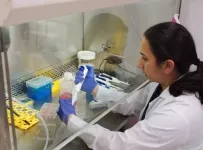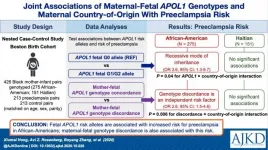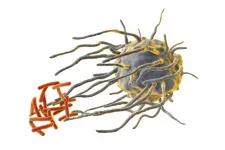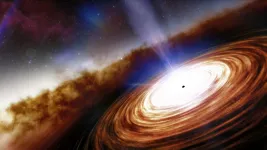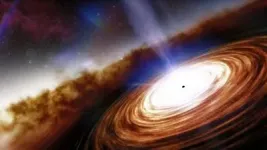Is the COVID-19 vaccine safe for nursing mothers?
2021-01-12
(Press-News.org) New Rochelle, NY, January 12, 2021--The Academy of Breastfeeding Medicine (ABM) does not recommend cessation of breastfeeding for individuals who are vaccinated against COVID-19. In a new statement, the ABM suggests that lactating women discuss the risks and benefits of vaccination with their health care provider, within the context of their risk of contracting COVID-19 and of developing severe disease, according to the peer-reviewed journal Breastfeeding Medicine. Click here to read the ABM statement now.
This is a challenging topic because the vaccine trials excluded lactating women. Thus, there are no clinical data regarding the safety of the Pfizer/BioNtech or the Moderna vaccine in nursing mothers. According to the ABM statement, "there is little biological plausibility that the vaccine will cause harm, and antibodies to SARS-CoV-2 [the virus that causes COVID-19] in milk may protect the breastfeeding child."
"Without clinical data, the Academy of Breastfeeding Medicine relied on biological plausibility and expert opinion to craft a statement on considerations for mRNA COVID-19 vaccines in lactation," says Alison Stuebe, MD, President of ABM. "The available information is reassuring; however, pregnant and lactating people deserve better than plausibility to guide medical decisions. Henceforward, phase 3 clinical trials should routinely include pregnant and lactating participants. It's time to protect pregnant and breastfeeding individuals through research, not from research."
Arthur I. Eidelman, MD, Editor-in-Chief of Breastfeeding Medicine, states: "The publication of the balanced ABM statement will serve as an immediate guide for clinicians and families in deciding to proceed with Covid-19 vaccination of nursing mothers."
INFORMATION:
About the Journal
Breastfeeding Medicine, the official journal of the Academy of Breastfeeding Medicine, is an authoritative, peer-reviewed, multidisciplinary journal published 10 times per year in print and online. The Journal publishes original scientific papers, reviews, and case studies on a broad spectrum of topics in lactation medicine. It presents evidence-based research advances and explores the immediate and long-term outcomes of breastfeeding, including the epidemiologic, physiologic, and psychological benefits of breastfeeding. Tables of content and a sample issue may be viewed on the Breastfeeding Medicine website.
About the Academy of Breastfeeding Medicine
The Academy of Breastfeeding Medicine is a worldwide organization of medical doctors dedicated to the promotion, protection, and support of breastfeeding. Our mission is to unite members of the various medical specialties with this common purpose. For more than 20 years, ABM has been bringing doctors together to provide evidence-based solutions to the challenges facing breastfeeding across the globe. A vast body of research has demonstrated significant nutritional, physiological, and psychological benefits for both mothers and children that last well beyond infancy. But while breastfeeding is the foundation of a lifetime of health and well-being, clinical practice lags behind scientific evidence. By building on our legacy of research into this field and sharing it with the broader medical community, we can overcome barriers, influence health policies, and change behaviors.
About the Publisher
Mary Ann Liebert, Inc., publishers is known for establishing authoritative peer-reviewed journals in many promising areas of science and biomedical research. A complete list of the firm's 90 journals, books, and newsmagazines is available on the Mary Ann Liebert, Inc., publishers website.
[Attachments] See images for this press release:
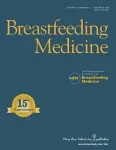
ELSE PRESS RELEASES FROM THIS DATE:
2021-01-12
The body's immune system is the first line of defense against infections like bacteria, viruses or cancers. Some cancers, however, have developed the art of molecular deception to avoid destruction by the body's immune system. However, a University of Missouri researcher might have found a new way to help the body's immune system get past that deception and destroy the cancer.
"Normally, your body's immune cells are constantly on patrol to identify and destroy foreign entities in the body," said Yves Chabu, an assistant professor in the Division of Biological Sciences. "Normal cells put up a 'don't-eat-me' molecular ...
2021-01-12
Acknowledging that COVID-19 may be here to stay, Oregon Health & Science University has laid out a series of steps to prepare patients for elective surgery following their illness.
The evaluation, outlined in a commentary published in the journal Perioperative Medicine, is believed to be the first published protocol laying out a COVID-era path forward in American medicine.
"We think this is groundbreaking," said senior author Avital O'Glasser, M.D., associate professor of medicine (hospital medicine) in the OHSU School of Medicine. "We are hoping other clinics and surgical centers can use this to keep their patients safe."
The work started around Memorial Day, when OHSU clinicians began to see an increasing number of patients ...
2021-01-12
Fetal APOL1 kidney risk alleles are associated with increased risk for preeclampsia in African Americans and maternal fetal genotype discordance is also associated with this risk.
Preeclampsia, characterized by increased blood pressure after 20 weeks of pregnancy, as well as other abnormalities (e.g., protein in the urine), is dangerous to mothers and their infants. Previous studies found that individuals with African ancestry may carry APOL1 genetic variants that increase risk for chronic kidney disease. This study published in the American Journal of Kidney Diseases (AJKD) found that fetal high-risk APOL1 genotypes and maternal-fetal APOL1 genotype discordance independently contribute to preeclampsia risk in African-American mothers. This ...
2021-01-12
TROY, N.Y. -- An analysis of an exhaustive dataset on cells essential to the mammalian immune system shows that our ability to fight disease may rely more heavily on daily circadian cycles than previously assumed.
Malfunctions in circadian rhythms, the process that keeps our bodies in tune with the day/night cycles, are increasingly associated with diabetes, cancer, Alzheimer's, and many other diseases. An investigation published today in Genome Research shows that the activity of macrophages -- cells within us that seek and destroy intruders like bacteria -- may time daily changes in their responses to pathogens and stress through the circadian control of metabolism.
In this study, ...
2021-01-12
Organizations seeking to fill internal roles traditionally have two options: promote from within or hire externally. Internal promotions benefit from being vetted talent who possess firm-specific skills while outside hires harbor external knowledge that can infuse an organization with new energy. Though this dichotomy is often accepted as unavoidable, there is a third option: boomerang employees.
Boomerang employees are those who return to an organization after an amicable absence. Whether the absence was for personal or professional reasons, their return provides unique value to an ...
2021-01-12
A team of astronomers led by the University of Arizona has observed a luminous quasar 13.03 billion light-years from Earth - the most distant quasar discovered to date. Dating back to 670 million years after the Big Bang, when the universe was only 5% its current age, the quasar hosts a supermassive black hole equivalent to the combined mass of 1.6 billion suns.
In addition to being the most distant - and by extension, earliest - quasar known, the object is the first of its kind to show evidence of an outflowing wind of super-heated gas escaping from the surroundings of the black hole at a fifth of the speed of light. In ...
2021-01-12
An international team of astronomers has discovered the most distant quasar yet found -- a cosmic monster more than 13 billion light-years from Earth powered by a supermassive black hole more than 1.6 billion times more massive than the Sun and more than 1,000 times brighter than our entire Milky Way Galaxy.
The quasar, called J0313-1806, is seen as it was when the Universe was only 670 million years old and is providing astronomers with valuable insight on how massive galaxies -- and the supermassive black holes at their cores -- formed in the early Universe. The scientists presented their findings to the American Astronomical Society's meeting, now underway virtually, and in a paper accepted to ...
2021-01-12
Maunakea, Hawaii - The most distant quasar known has been discovered. The quasar, seen just 670 million years after the Big Bang, is 1000 times more luminous than the Milky Way, and is powered by the earliest known supermassive black hole, which weighs in at more than 1.6 billion times the mass of the Sun. Seen more than 13 billion years ago, this fully formed distant quasar is also the earliest yet discovered, providing astronomers with insight into the formation of massive galaxies in the early universe. The result was released today at the January 2021 meeting of the American Astronomical Society (AAS).
Quasars, which are powered by the feeding frenzies of colossal supermassive black holes, are the most energetic objects ...
2021-01-12
The American Society of Hematology (ASH), the International Society on Thrombosis and Haemostasis (ISTH), National Hemophilia Foundation (NHF), and World Federation of Hemophilia (WFH) have developed joint clinical practice guidelines on the diagnosis and management of von Willebrand Disease (VWD), the world's most common inherited bleeding disorder. The guidelines were published today in Blood Advances.
VWD affects approximately 1% of the world's population, and it is the most common bleeding disorder. Although VWD occurs among men and women equally, women are more likely to notice the symptoms because of heavy or abnormal bleeding during their menstrual periods and after childbirth. This inherited condition results in the ...
2021-01-12
LA JOLLA, CALIF. - Jan 12, 2020 - Scientists at Sanford Burnham Prebys Medical Discovery Institute have identified the sensor in human lungs that detects SARS-CoV-2 and signals that it's time to mount an antiviral response. The study, published today in Cell Reports, provides insights into the molecular basis of severe disease and may enable new strategies for the treatment and prevention of COVID-19.
"Our research has shown that MDA-5 is the immune cop that's tasked to keep an eye out for SARS-CoV-2 and call for back-up," says Sumit Chanda, Ph.D., director of the Immunity and Pathogenesis Program at Sanford Burnham Prebys and senior author of the study. ...
LAST 30 PRESS RELEASES:
[Press-News.org] Is the COVID-19 vaccine safe for nursing mothers?

